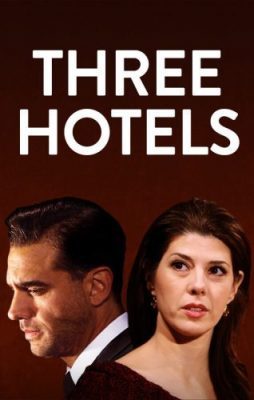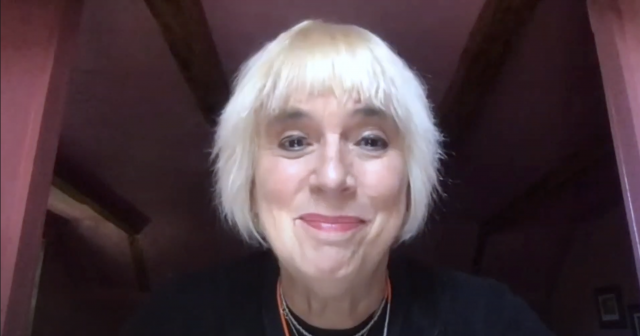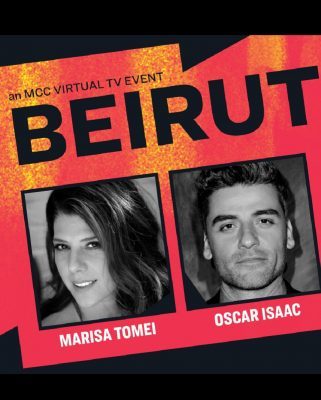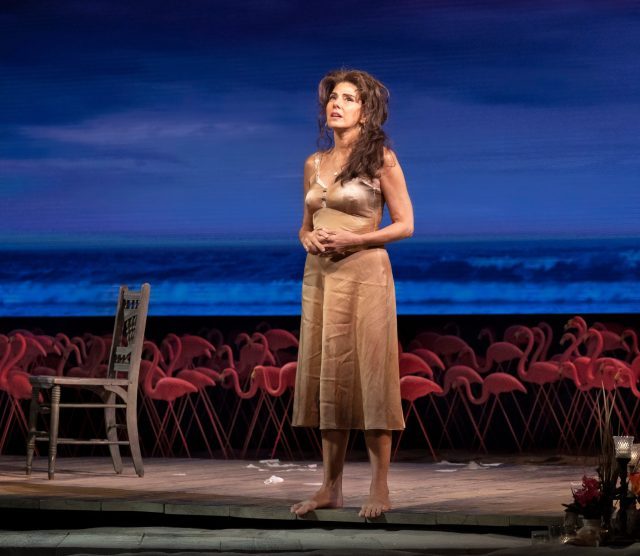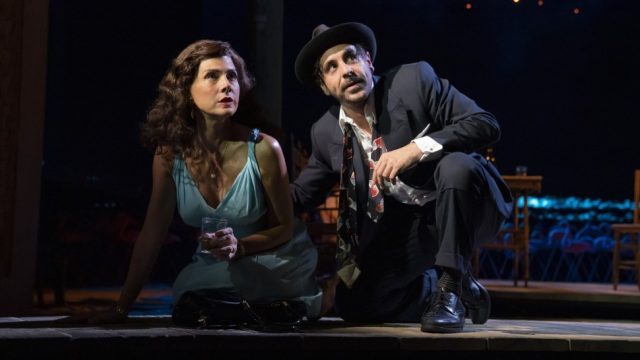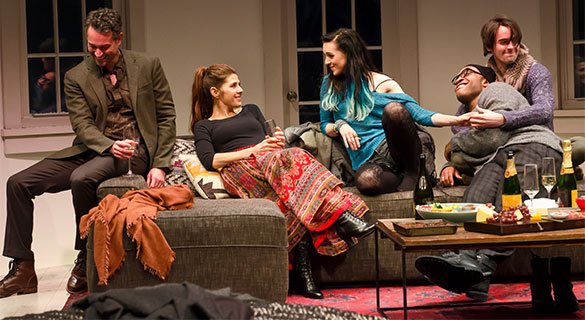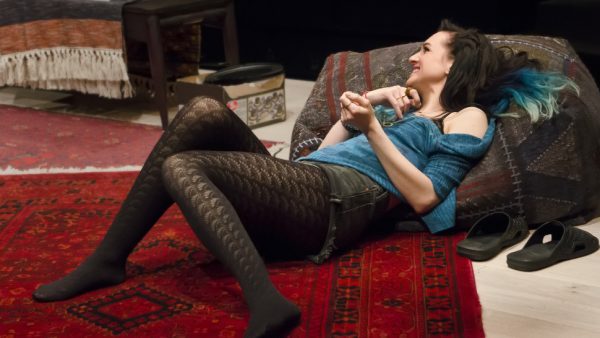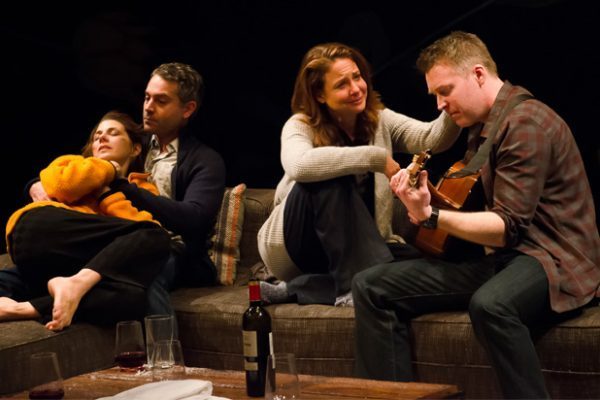
The Light and the Dark looks at the life and times of Italian painter Artemisia Gentileschi (photo by James Leynse)
THE LIGHT AND THE DARK (THE LIFE AND TIMES OF ARTEMISIA GENTILESCHI)
Primary Stages, 59E59 Theaters
59 East 59th St, between Park & Madison Aves.
Tuesday – Sunday through December 15, $66-$131
www.59e59.org
After seeing Kate Hamill’s The Light and the Dark (the life and times of Artemisia Gentileschi) and Jessica Goldberg’s Babe on the same day, I was hard-pressed to figure out why every woman doesn’t just go all Judith on their own Holofernes. While both plays explore misogyny, sexism, control of a woman’s body, and the dominant patriarchy in the arts, one does so much better than the other, although neither is ultimately successful.
At 59E59, Primary Stages is presenting The Light and the Dark, about Artemisia Gentileschi, the early Italian Baroque painter whose career was temporarily derailed by sexual assault and gender discrimination. Hamill’s previous feminist-driven works include stirring adaptations of Little Women, Pride and Prejudice, Sense and Sensibility, Vanity Fair, and Dracula. She has portrayed such characters as Becky Sharp, Elizabeth Bennet, Meg March, Renfield, and Marianne Dashwood; in The Light and the Dark she inhabits the title role with a tender ferociousness as Artemisia matures from a precocious seven-year-old girl to one of the most talented and important artists of her era, even as she’s held back by men and social mores every step of the way.
Artemisia knows what she wants from a young age. Her Tuscan-born father, Orazio (Wynn Harmon), is a naturalistic, technically skillful painter who delivers precisely what his patrons desire. Admitting he doesn’t know how to raise a girl on his own, he decides to send her to a nunnery for her education, telling his daughter, “Think, if I build a big enough fortune and you mark the sisters well enough, you may be a fine lady — the wife or the mother of the great artist of tomorrow!” Misia, as he calls her, responds, “I don’t want to be a lady! I am I, your Artemisia. And I want to be a painter!”
When she is nine, Orazio lets Misia begin working in his studio, and six years later she is allowed to start painting alongside Agostino Tassi (Matthew Saldívar) and Cosimo Quorli (Jason O’Connell), which could be considered scandalous, especially when Orazio brings in a nude model, a sex worker named Maria (Joey Parsons). Soon the arrogant Agostino takes a personal interest in Artemisia, who is proving to be an exceptional artist with a unique perspective on traditional biblical scenes, and scandal does indeed ensue, against Artemisia’s will.
Artemisia Gentileschi has been undergoing a renaissance of her own this century, a heroic figure for the current time, spurred on by the 2002 Met exhibit “Orazio and Artemisia Gentileschi: Father and Daughter Painters in Baroque Italy,” such books as Mary D. Garrard’s Artemisia Gentileschi and Feminism in Early Modern Europe and Gina Siciliano’s I Know What I Am: The Life and Times of Artemisia Gentileschi, and such plays as Sara Fellini’s NEC SPE / NEC METU and Howard Barker’s Scenes from an Execution. Artemisia often repeats “I, I, I” when talking about herself, trying to establish an identity that her father and his friends will not allow her to have because she is a woman, and she is prone to cursing like a sailor, dropping F-bombs again and again.
“Before Caravaggio, painters / Started with the light. / Blank canvas, blank fresco, / And painted layers upon that blankness — / But Caravaggio starts in the darkness / And carves his way out from the shadows,” she says in a way that refers to her own situation. She also declares, as if for all women, “Why should I suffer for nothing? / If I cannot undo it — and I cannot undo it. . . . / I can make it right. / I can control it.”
The show is visually beautiful, from Brittany Vasta’s alluring studio set to Jen Caprio’s lovely period costumes, Seth Reiser’s lighting, and Kylee Loera’s projections of such masterworks by Artemisia as Judith and Holofernes, Susanna and the Elders, The Allegory of Inclination, and Madonna and Child. The cast is effective, but Hamill and director Jade King Carroll too often get caught up in overly earnest monologues and preachy explications; Artemesia speaks at the audience instead of to them. Several didactic art lectures could have been cut or shortened — the play is too long at two and a half hours with intermission — in favor of the narrative itself, which can be compelling.
However, Carroll and Hamill do make The Light and the Dark feel relevant to what is happening today, particularly in the wake of the overturning of Roe v. Wade. Both female actors, Hamill as Artemisia and Parsons as Maria, ultimately take ownership of their bodies away from the men while subverting the male gaze; each gets fully nude, standing boldly onstage, not mere naked subjects to be depicted on canvas but real women shouting out their independence. They might not be holding daggers, preparing to cut off a perpetrator’s head, but you can see and feel their weapons nonetheless.
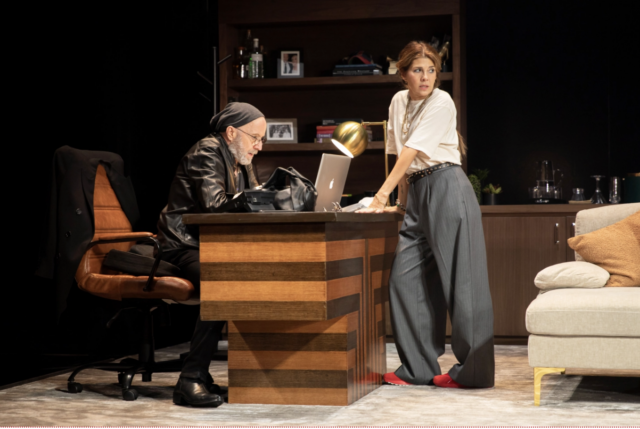
Gus (Arliss Howard) and Abby (Marisa Tomei) wonder about a new employee in Babe (photo by Monique Carboni)
BABE
The New Group at the Pershing Square Signature Center
The Alice Griffin Jewel Box Theatre
480 West 42nd St. between between Ninth & Tenth Aves.
Tuesday – Sunday through December 22, $99-$119
thenewgroup.org
Jessica Goldberg’s Babe has much in common with Kate Hamill’s The Light and the Dark (the life and times of Artemisia Gentileschi); instead of taking place in the world of Baroque painting, it is set in the contemporary music industry, where an old-school record producer, Gus (Arliss Howard), spews sexism and misogyny in his search for artists with a soul. He gives short shrift to his longtime right-hand person, Abby (Marisa Tomei), who discovered 1990s sensation Kat Wonder (Gracie McGraw) but has never received the recognition she deserves.
When a young Gen Z woman, Katherine Becker (McGraw), comes in for a job interview and ultimately gets hired, each character’s flaws become exposed, as well as their strengths, but it is hard to care in this lackluster story searching for its own purpose, never filling in the blank canvas it started with.
Comparisons abound between the two shows. “I don’t want to make people feel great, I want to destroy shit! I want the girls in the front, moshing the fuck out of each other!” Kat declares in a way Gentileschi never would have. Abby, who is gay, explains, “People think if you’re a certain age without a partner, you’re alone. But it’s not true,” evoking Artemisia saying, “I have no interest — in marrying,” but with less conviction. While Hamill empowers Artemisia, having her stand onstage naked, using her body as a model for the self-portrait Allegory of Inclination, Goldberg makes Abby sexless, having had a double mastectomy as a result of cancer. “So it doesn’t really make me feel —” she tells Katherine, implying she lacks physical and emotional desire and confidence. While The Light and the Dark references Caravaggio, Michelangelo, Donatelli, and Botticelli, Babe brings up Liz Phair, Bob Dylan, Joan Jett, and Kathleen Hannah.
At one point in The Light and the Dark, men assume that Artemisia did not actually paint anything, that a woman is incapable of creating high-quality art and that someone else must be behind it all, which is one of the reasons Artemisia signs her name on her canvases “in bold type . . . And wait for my accolades to roll in!” In Babe, a New Group production at the Pershing Square Signature Center, Abby eventually asserts, “I want my NAME. On the record.” As women in fields run by men, neither receives those accolades, but Abby has settled for compromising where Artemisia keeps up the fight.
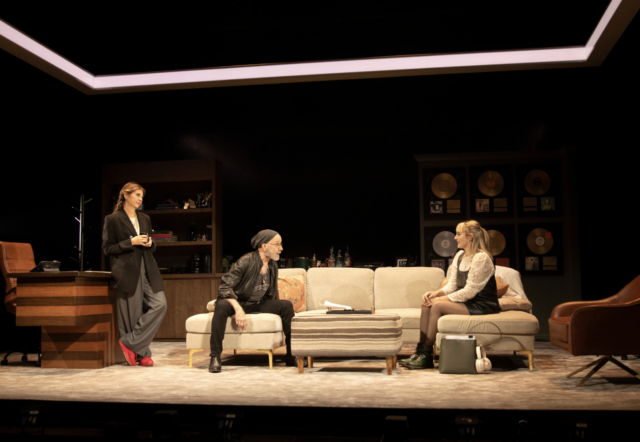
Marisa Tomei, Arliss Howard, and Gracie McGraw star in the New Group’s Babe
(photo by Monique Carboni)
During the job interview, amid outdated questions that would drive a human resources department to drink, Gus asks Katherine, “Do you have a soul?” Unfortunately, it’s Babe itself that lacks heart and soul. Even at only eighty-five minutes it drags on, like side two of an old record that doesn’t live to up to the flip side.
Derek McLane’s office set is attractive and BETTY’s original music is fine, but the narrative and time shifts are bumpy; director Scott Elliott never gets a handle on the rhythm. Interestingly, although Gus has a disdain for groups, preferring solo artists performing songs written by others, he wears a Killers T-shirt, the Las Vegas band led by lead singer and chief songwriter Brandon Flowers. The costumes, which never change, are by Jeff Mahshie.
Whereas it is obvious why Hamill made The Light and the Dark, celebrating a woman who faced tremendous obstacles in order to express herself through her remarkable art, it is decidedly unclear what points Goldberg (Refuge, Good Thing) is trying to make in Babe; it’s like a concept album without a concept. It purports to be about “the American spirit of individualism,” as Abby says, as well as the resistance to the DEI movement, but it’s as flat as an LP that is not going to go gold or platinum anytime soon, instead gathering dust on a shelf.
[Mark Rifkin is a Brooklyn-born, Manhattan-based writer and editor; you can follow him on Substack here.]
